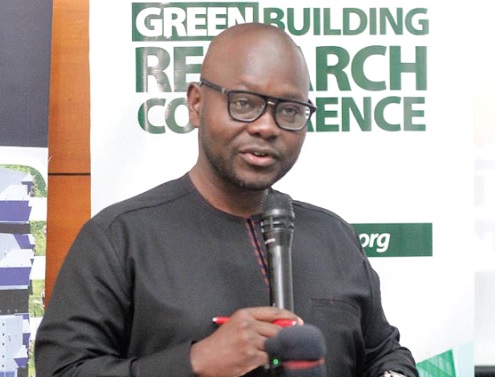
Govt establishes framework for green building regulations
The government has established a regulatory framework, to incorporate Green Building Regulations.
The Minister of Works and Housing, Francis Asenso-Boakye, who made this known in Accra, said the framework included the Ghana Building Code and the review of the Building Regulations LI 1630 (1996).
He was speaking at the second Green Building Research Conference at the University of Ghana.
Principles
Speaking on the theme: “Mobilising Support for the roll-out of the Science, Technology and Innovation for Sustainable Human Settlements (STI4SHS) Roadmap and Advance an African Green Building and Development Agenda,” Mr Asenso-Boakye stated that, the initiative would play a significant role in ensuring the incorporation of green building principles in housing developments.
“The establishment of the Ghana Housing Authority, as approved by Cabinet, is a crucial step towards better regulation, planning, development and management of housing projects in the country,” he said.
“As we progress, we must prioritize climate-responsive design and resilience in our green buildings.
Extreme weather events demand structures that can withstand these challenges and provide safe havens for our communities,” Mr Asenso-Boakye said.
He was of the view that nature-based solutions, like green roofs and rainwater harvesting, would enhance climate resilience and disaster preparedness.
“In the face of the impacts of a changing climate, our nation remains steadfast in its commitment to sustainable practices and resilience,” he said.
Energy
The minister also expressed worry over the consumption of energy in buildings, where fossil fuel depletion posed a significant challenge to energy provision, hoping that energy efficiency and renewable energy integration must be at the core of Ghana’s green building agenda.
He suggested the adoption of innovative technologies and harnessing abundant renewable resources, such as solar, wind and hydropower, to significantly reduce the carbon footprint.
“To achieve our sustainability goals, the government has committed to using eco-friendly building materials in our revised National Affordable Housing programme and by incorporating locally sourced bricks and other sustainable materials, to minimise transportation-related emissions, ” he said.
Challenges
The minister mentioned the lack of knowledge and awareness within the industry, perceived higher cost of sustainable designs and failure to consider climate risks during the design phase, as some of the challenges hindering the success of the country’s green building agenda and called for collaboration among industry players for a lasting solution.
“To address these challenges and ensure the success of our green building agenda, we call for collaboration with development agencies, international partners, research institutions and governments,” he added.
He commended the organisers of the conference, saying: “As I take my seat, I wish to extend my appreciation to the organisers of this important event and remain hopeful that our collective efforts will lead us to the sustainable and green future we desire.
Together, let us forge ahead on this transformative journey.”
Green building
Green building refers to the design, construction and operation of buildings with a focus on reducing their environmental impact and promoting resource efficiency.
It goes beyond merely constructing structures; it involves creating living spaces that are energy-efficient, water-saving and environmentally responsible.
By adopting green building practices, we can minimise the consumption of natural resources, reduce carbon emissions and enhance the well-being of occupants. Green building practices have become paramount in addressing the environmental challenges of our time, and Ghana has taken significant strides towards promoting sustainable construction and development.
